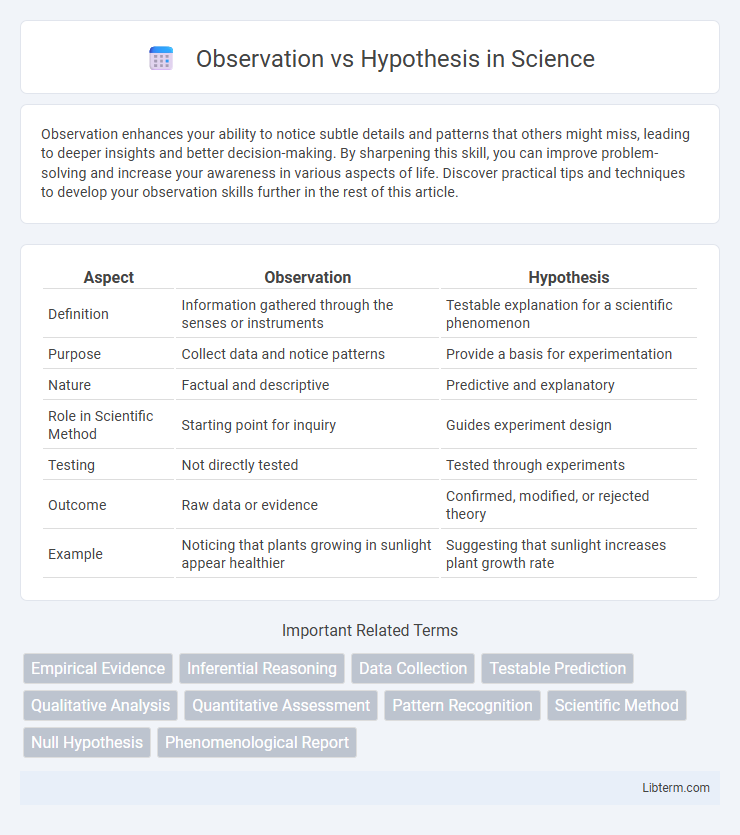Observation enhances your ability to notice subtle details and patterns that others might miss, leading to deeper insights and better decision-making. By sharpening this skill, you can improve problem-solving and increase your awareness in various aspects of life. Discover practical tips and techniques to develop your observation skills further in the rest of this article.
Table of Comparison
| Aspect | Observation | Hypothesis |
|---|---|---|
| Definition | Information gathered through the senses or instruments | Testable explanation for a scientific phenomenon |
| Purpose | Collect data and notice patterns | Provide a basis for experimentation |
| Nature | Factual and descriptive | Predictive and explanatory |
| Role in Scientific Method | Starting point for inquiry | Guides experiment design |
| Testing | Not directly tested | Tested through experiments |
| Outcome | Raw data or evidence | Confirmed, modified, or rejected theory |
| Example | Noticing that plants growing in sunlight appear healthier | Suggesting that sunlight increases plant growth rate |
Understanding Observation and Hypothesis
Observation involves gathering empirical data through the five senses or measurement tools, providing objective information about phenomena without interpretation. Hypothesis constitutes a testable and falsifiable statement predicting a relationship or outcome based on observations, serving as a foundation for scientific experiments. Understanding observation and hypothesis is crucial for forming valid scientific inquiries and advancing knowledge through systematic investigation.
Definition of Observation
Observation refers to the systematic process of gathering empirical data through the senses or instruments to detect and record phenomena as they naturally occur. It provides the foundational evidence upon which scientific inquiry builds by capturing measurable and verifiable information without interpretation. Unlike a hypothesis, which is a testable prediction, observation is the objective collection of factual details essential for analysis and theory formulation.
Definition of Hypothesis
A hypothesis is a testable, provisional explanation for a specific phenomenon or scientific problem that guides experimental design and data collection. It is formulated based on observations but goes beyond mere description by proposing a cause-and-effect relationship or prediction that can be empirically evaluated. Hypotheses often take the form of an if-then statement, providing a clear criterion for validation or falsification through systematic investigation.
Key Differences Between Observation and Hypothesis
Observation involves directly gathering data or evidence through the senses or scientific instruments, serving as the foundation of empirical research. A hypothesis is a testable and falsifiable statement or prediction derived from observations, designed to explain phenomena and guide experiments. Observations are factual and descriptive, while hypotheses are speculative and require validation through experimentation or further observation.
Role of Observation in Scientific Research
Observation plays a critical role in scientific research by providing empirical data that forms the basis for generating hypotheses. It allows researchers to identify patterns, anomalies, and phenomena that require explanation, guiding the formulation of testable predictions. Accurate and systematic observation enhances the reliability and validity of scientific investigations, ensuring that subsequent hypotheses are grounded in real-world evidence.
Role of Hypothesis in Scientific Investigation
The hypothesis serves as a foundational element in scientific investigation by providing a testable prediction that guides experimental design and data collection. It transforms observations into structured inquiries, enabling scientists to systematically explore causal relationships and underlying mechanisms. By generating hypotheses, researchers focus their investigations, facilitating the validation or refinement of scientific theories through empirical evidence.
Examples of Observation vs Hypothesis
Observation involves noting factual data, such as "The plant leaves are wilting," which directly describes a visible phenomenon. A hypothesis proposes a testable explanation, for example, "The plant is wilting due to insufficient water." Observations form the basis for hypotheses that guide scientific experiments and predictions.
Importance of Observation in Formulating Hypotheses
Observation is crucial in formulating hypotheses as it provides the empirical evidence necessary to identify patterns, anomalies, or phenomena worth investigating. Careful observation allows researchers to gather accurate data, which forms the foundation for developing testable and meaningful hypotheses. Without precise observation, hypotheses may lack relevance or fail to address real-world conditions effectively.
Common Mistakes: Confusing Observation with Hypothesis
Confusing observation with hypothesis is a common mistake that hinders scientific clarity, where observations are factual data collected through the senses or instruments, while hypotheses are testable predictions based on those facts. Many learners misinterpret observations as explanations rather than objective evidence, leading to biased conclusions. Clear differentiation between empirical evidence and speculative guesses is essential for proper scientific methodology and effective experimentation.
Observation and Hypothesis in the Scientific Method
Observation in the scientific method involves carefully gathering data and noting phenomena using the senses or instruments, serving as the foundation for forming hypotheses. A hypothesis is a testable and falsifiable prediction derived from observations, guiding experimental design to confirm or refute the proposed explanation. Together, observation and hypothesis drive the iterative process of scientific inquiry, ensuring evidence-based conclusions.
Observation Infographic

 libterm.com
libterm.com